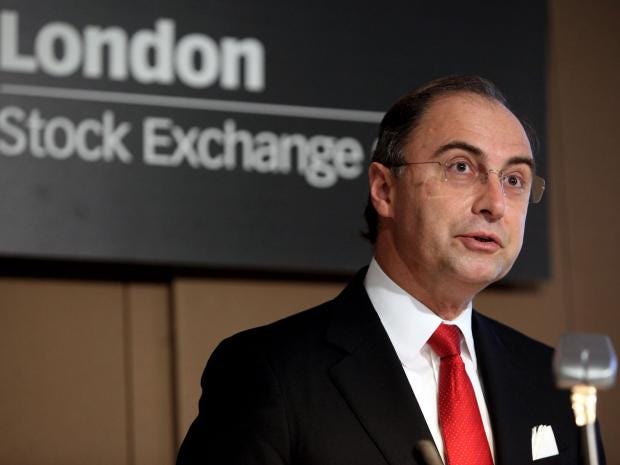
Two prominent City of London figures have warned EU leaders about the dangers of stripping London of the lucrative euro clearing trade after Brexit.
A proposed move could cost investors €100bn (£83bn) over five years, Xavier Rolet, chief executive of the London Stock Exchange, said on Monday. Seperately, Michael Spencer, founder of broker Icap described the proposal as, “a real nasty piece of economic nationalism and protectionism”.
Clearing is a process whereby trades go through an organisation known as a clearing house which holds collateral centrally and ensures transactions go ahead in the event of a default. It is designed to prevent a domino effect where the default of one counterparty causes a string of losses for others.
Clearing is a crucial part of the financial infrastructure and London is the dominant centre in Europe. Around 70 per cent of euro-denominated trades, with a notional value of €930bn (£792bn), are cleared in the capital each day, according to a 2016 House of Lords report.
In The Times on Monday, Mr Rolet wrote that moving euro clearing out of London would “increase, not reduce, levels of systemic risk and increase costs for European companies, diverting capital away from the European economy.”
He added: “London clears 18 major currencies and these multi-currency netting efficiencies meant LCH [London Stock Exchange’s clearing house] saved its customers $21bn in capital last year. Strip out euro clearing and you lose these efficiencies, potentially increasing cumulative trading costs by €100bn over five years.
“If Europe insists on trying to implement an artificial, inefficient location policy, it will only hurt the European capital markets and real economy.”
The LSE boss said that moving clearing, which is estimated to support up to 100,000 jobs would, “fragment global markets.”
Also on Monday, Icap founder Michael Spencer told the BBC’s Today Programme that ending euro clearing in London could damage Europe as well as the UK.
He said: “I haven’t heard the Japanese phone up and say we’re not having yen cleared in London or the Australians phoning up and say enough of you clearing our dollars, we’ll have that back.
“So, this proposal in Europe to repatriate euro clearing to the eurozone, is nothing more than a real nasty piece of economic nationalism and protectionism.” EU officials have taken an increasingly hard-line position on the clearing business as Brexit negotiations loom.
Last month, Manfred Weber, a political ally of German Chancellor Angela Merkel and European Commission president Jean-Claude Juncker said: “People expect that we do the euro business and all the business which is linked to the euro on European soil.”
Mr Weber, who heads the European People’s Party, the largest group in the European Parliament, said that it was not conceivable that euro-denominated business could remain in London.
The EU executive branch has not yet stated a clear position on the issue ahead of the upcoming Brexit negotiations, but proposals have been mooted.
In September EU officials began discussing plans to limit the number of euro trades that could be processed in New York so that similar restrictions can be placed on London when it is outside the EU.
The European Central Bank believes the clearing business must be within the eurozone to facilitate the supervision of activities that could endanger financial stability if not properly monitored.
In 2015, the ECB attempted to relocate clearing of euros to within the currency zone, but the European Court of Justice ruled that the bank did not have the competence to regulate the industry.
[“Source-ndtv”]




